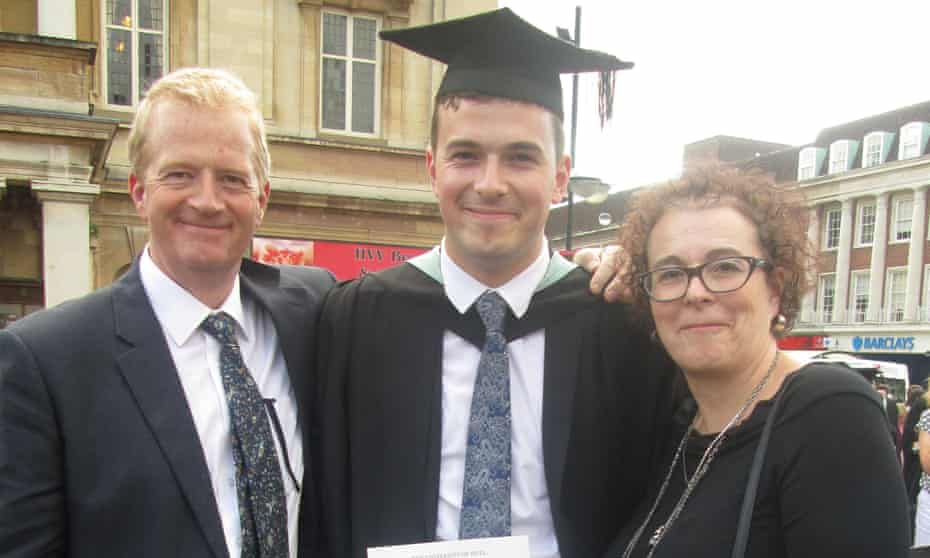Jack Ritchie: coroner condemns ‘woefully inadequate’ care for gambling addict
Narrative verdict reached in inquest into English teacher who killed himself in 2017

A coroner has described as “woefully inadequate” the information and treatment available for a 24-year-old problem gambler who took his own life in Vietnam.
David Urpeth, the Sheffield coroner, on Friday delivered a narrative conclusion into the inquest of Jack Ritchie, a gambling addict who was teaching English in Hanoi.
His parents, Charles and Liz Ritchie, had tenaciously fought for an inquest that not only examined their son’s death but also state regulation of the gambling industry.
The coroner did not rule that any arm of the state had directly breached any duty to protect Ritchie’s life.
But Urpeth said “warnings, information and treatment” for problem gamblers at the time of Ritchie’s death were “woefully inadequate and failed to meet Jack’s needs”. The situation had improved but there was still “significantly more” that needed to be done.
Jack’s parents, speaking afterwards on the steps of Sheffield town hall, said the coroner had identified “multiple state failings”.
They added: “For us, this inquest has been about justice for Jack. Jack died believing he was the problem and he was harming us and his family. This is not true and the coroner found explicitly that it was not Jack’s fault.
“Jack was abused by parasites who inflict life-threatening illness for profit and then blame the victims.
“Jack’s inquest revealed that the link between gambling and suicide has been known for years but it’s taken the deaths of thousands to start to make proper change.”
The Ritchie family argued that gambling killed their son. “It was the long-term root and the short-term trigger of Jack’s death,” they said.
Urpeth suggested that was a step too far. Instead, he said it was “abundantly clear” that gambling contributed to Ritchie’s death.
He said he would write to government departments and gambling agencies with warnings about how future deaths could be prevented. He highlighted the need for more training for GPs about gambling disorders.
Urpeth praised Ritchie’s parents and said they had done all they could to help their son.
It is believed to be the first time article 2 of the Human Rights Act has been engaged in a case relating to suicide after gambling. That meant its scope included examining whether any arm of the state breached its duty to protect Ritchie’s right to life.
Engaging article 2 had been opposed by lawyers representing the government.
Ritchie’s gambling problem began when he was a sixth-former at school, betting small stakes at a betting shop on controversial fixed-odds betting terminals (FOBTs).
It escalated over time, with Ritchie gambling away money left to him by his grandmother, his student loan while studying history at Hull University and, while he was in Vietnam, his overdraft.
Jack’s parents set up a charity, Gambling With Lives, to support affected families and raise awareness of the dangers gambling brings. The campaign says “very normal, bright, popular and happy young folk” are killing themselves and “gambling was their only problem”.
Ritchie was described by his father as “big in physique and in personality … big in heart and in spirit”.
Witnesses at the inquest included Sarah Gardner, the deputy chief executive of the Gambling Commission. It was put to her that action in addressing gambling-related suicide had been disappointing. “I wouldn’t disagree with that,” she said.
Another witness was Jonathan Marron, a senior civil servant at the Department of Health and Social Care, who said: “I don’t think there’s any dispute that there’s an association between gambling and suicide.”
As his session finished, Marron, the director general for the Office for Health Improvement and Disparities, choked back tears as he acknowledged the trauma Jack’s parents had been through.
He was the father of a teenage daughter, he said. “It’s clear that the work you have done has had a significant role in changing the focus of this issue.”
Everything changed for Ritchie, the inquest heard, when he won £1,000 in less than 30 seconds. From then on it was about chasing his losses and waiting for the big win.
Ritchie killed himself in Hanoi in November 2017. Forensic evidence presented to the inquest showed he was a regular visitor to the BetVictor online gambling website in the days leading up to his death.
In the UK and Ireland, Samaritans can be contacted on 116 123 or by emailing jo@samaritans.org or jo@samaritans.ie. In the US, the National Suicide Prevention Lifeline is 1-800-273-8255. In Australia, the crisis support service Lifeline is 13 11 14. Other international helplines can be found at befrienders.org.
